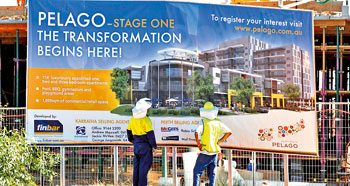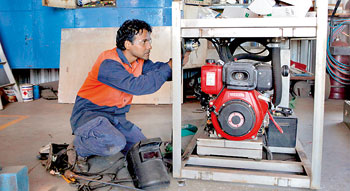DUBLIN/SYDNEY, (Reuters) - About 100 men in their 20s and 30s, filled a conference room at a Dublin hotel last week to hear a migration agent describe the personal fortunes waiting to be made a world away in the booming mining towns of the Australian outback.
With unemployment running at close to 15% in Ireland, and local wages a fraction of those now on offer in Australia, it appeared to be an easy sell. "I want to go and make money, not just get by," said David Varley, 29, who had been laid off a few weeks earlier from his job as a railway-signals engineer. "A friend just got a job at a mine and she said they're looking for engineers, though I'm not sure what kind."
His friend had lost her job as a quantity surveyor and was thinking of applying for unemployment benefits when she turned to the Internet and immediately saw lots of Australian job ads.
Six months later, she was working at a mine there. "Of course I'd rather stay at home with my friends and family, but if you have to go, you have to go," Varley said.
"The amount of people who've left my town to work abroad is phenomenal."
The new migrants are continuing an old tradition. Irish and English were among Australia's first settlers, shipped to the continent as convict labor starting in the late 18th century.
Australia's 1851-1861 Gold Rush lured hundreds of thousands more from the British isles and they continued to stream in, seeking their fortunes in goldmines, until the early 20th century.
"They are not coming back"
Migration agent Declan Clune, of international firm Visa First told the men at the Dublin meeting that carpenters could earn $90,000 a year and engineers and surveyors up to $200,000. "There are a huge number of highly skilled people leaving.
And they're not coming back," Clune said. "We have the skilled educated population that Australia needs. Canada may be closer, but all the work is in Australia.
And Australia is the place people want to go."
In Australia, though, immigration agents discover not all Europeans are cut out to work in an open-cut mine under a baking sun and live in remote mining towns like Karratha, where workers sleep in camps built from converted shipping containers.
 |
| Workers stand in front of a billboard at a housing development under construction in Karratha in the Pilbara region of Western Australia. Reuters |
 |
| Mohammed Monirul Islam from Bangladesh works inside the Karratha Aluminium Welding workshop in Karratha April 19, 2011. Islam says he has dreamed since childhood of leaving the political problems and pollution of Bangladesh behind and forging a new life overseas. Reuters |
"Potentially there are big fat pay packets for some people and, yes, the skies are sunny - sometimes too sunny - but it will be a bit different for people from Dublin to live in 40-degree heat in Karratha," said James Maund, general manager of recruitment firm Manpower Australia.
Australia's overseas recruitment drive has so far focused on skilled workers, ranging from mine engineers and geologists to boiler-makers and electricians. Its demand for these skills has been so great mine labour is now scarce worldwide.
In Laos, China-owned Minmetals is flying in miners from as far away as Poland to work its Sepon copper and gold mine there.
It brings them in for two weeks at a time in the kind of shuttle operation now familiar to mining firms the world over.
In Australia, air shuttles also bring in Poles, along with workers from New Zealand, the United States and across Asia, especially from among the relatively good English-speakers of the Philippines.
No limit on visas
Yet the labour shortage persists.
Some employers in Australia blame red-tape, saying the process of issuing short-term work permits for skilled labour, known as 457 visas, is too costly and should be sped up.
The government imposes no limit on the number of 457 visas that can be issued, but it demands employers show they cannot first find or train up Australians for the jobs.
Foreign workers must also have a high level of proficiency in English, a tough condition for many Asians.
Australian business executive Rod Eddington, who now advises the government on infrastructure spending, called last week for the nation's doors to be opened wider to Asian workers in particular, suggesting there was a reluctance to hire them.
"I know it's a hot political topic and a difficult issue to address," Eddington told a business lunch. "But I for a start would be much more liberal with 457 visas and also more open to skilled Asian immigrants here because they add real value to our community."
Shortages are so dire mining companies are now turning to unskilled foreign workers -- known as "clean-skins" in the industry -- to train them up for work in the pits.
Even office workers in Sydney have begun to hang up their suits and ties and swap them for mine overalls, and the farm sector is worried mines will soon tempt their own workers to the desert, leaving them desperate for labour. |



